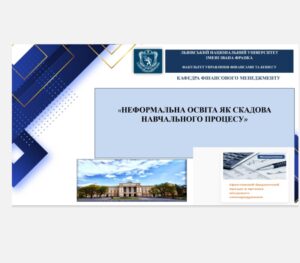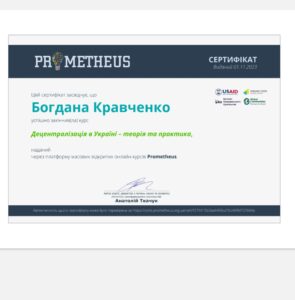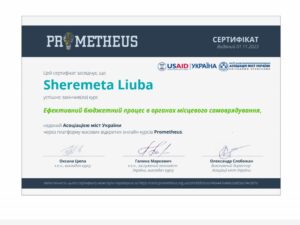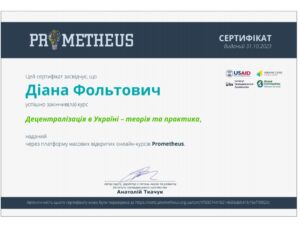INFORMAL EDUCATION AS A DESTRUCTION OF THE EDUCATIONAL PROCESS
Informal education, which is usually organized in the form of professional training courses, master classes or seminars, is a supplement to formal education in the training of the applicant, and allows to increase professional qualifications, develops interpersonal interaction skills, and strengthens managerial, organizational, and communicative competences (soft skills).
Graduates of the “Finance, Customs and Tax Affairs” educational program of the second (master’s) level, striving for self-improvement, deepening of practical knowledge in the field of finance, as well as based on the conditions of constant updating of information and legislative changes during the war, combine elements of informal and formal education with study of the selective educational component “Management of finances of territorial communities” (teacher – associate professor Oksana ZAKHIDNA).
A student of the UFFM-11 group from Sheremeta Lyubov took and successfully completed the course “Effective budgeting process in local self-government bodies”, provided by the Association of Cities of Ukraine through the platform of mass open online courses Prometheus, and confirmed the acquired knowledge with a certificate. A significant place in the training course is devoted to the processes of formation of the revenue and expenditure parts of local budgets (including TG) and the budget equalization system.
Graduates of higher education Bohdana Kravchenko and Diana Foltovych also took and completed the course “Decentralization in Ukraine – theory and practice” through the Prometheus platform. The course tells about the combination of theory and practice, real stories of innovative solutions that appeared in various territorial communities during the reform process. After mastering all topics and passing tests, students received certificates.
Therefore, informal education in modern conditions of development becomes a source of replenishment of necessary knowledge, provides new opportunities for self-realization of the individual and contributes to the improvement of professional training (hard skills), which modern employers value the most.



